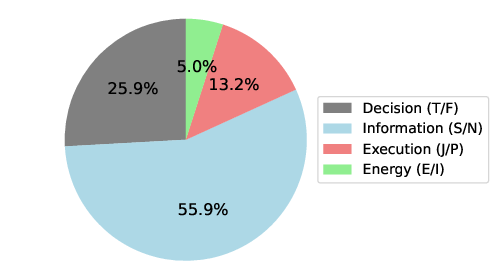- The paper presents a dual-phase fine-tuning process that embeds MBTI traits into LLMs using SFT with LoRA and subsequent DPO.
- Key evaluations using adapted MBTI questionnaires confirm clear alignment between model responses and intended personality traits.
- Experimental results and ablation studies reveal that dataset balance affects personality diversity, enhancing personalized AI interactions.
Machine Mindset: An MBTI Exploration of LLMs
Introduction
The integration of personality into AI models represents a significant advancement in human-computer interaction. The paper, "Machine Mindset: An MBTI Exploration of LLMs," presents a methodology for embedding Myers-Briggs Type Indicator (MBTI) personality traits into LLMs. The approach, termed "Machine Mindset," utilizes a dual-phase fine-tuning process augmented by Direct Preference Optimization (DPO) to ensure stable and consistent personality profiles in LLMs. This research enriches personalized AI applications by providing a structured method to internalize personality traits within LLMs, facilitating interactions that are not only context-sensitive but also personality-consistent.
Methodology
The proposed method involves two principal components: dataset construction and model fine-tuning. The researchers constructed two dataset types—behavior datasets for imbibing personality-responsive behavior into LLMs, and self-awareness datasets to induce awareness of these traits in models.
Dataset Construction: (Figure 1) illustrates the workflow for creating both behavior and self-awareness datasets, which are pivotal to the training process. The behavior datasets customize the Alpaca dataset to align with specific MBTI traits, thus standardizing responses according to personality dimensions. Self-awareness datasets consist of Q&As that focus on the characteristics and introspective aspects of the MBTI personality types, promoting a model's self-reflection capability.

Figure 1: The flowchart for constructing behavior datasets and Self-awareness datasets.
Fine-tuning LLMs: The training incorporates a two-stage fine-tuning process leveraging Supervised Fine-Tuning (SFT) with LoRA for computational efficiency. Each LLM is trained for specific MBTI types through the custom datasets. Subsequent DPO aligns the model responses with MBTI dimensions, reinforcing model preference for personality-consistent language generation.
Evaluation
The framework was evaluated through MBTI questionnaire testing and performance assessments across several domains. The MBTI tests, adapted for clarity, aimed to ensure the LLMs demonstrated the intended personality traits. Performance metrics assessed the quality and relevance of LLMs' generated responses, with satisfactory alignment observed between personality traits and corresponding capabilities.

Figure 2: The ratio of the four MBTI dimensions in behavior datasets.
Experimental Results
The experimental results highlight that the LLMs trained under the "Machine Mindset" framework effectively mirrored the MBTI personalities they were aligned with. Notably, personality types showed significant diversity in response patterns, reaffirmed by the variation in dataset compositions, which impacts the training outcomes. Ablation studies demonstrated that adjusting dataset balances influences the model's personality representation and overall performance.
Implications and Future Directions
Practically, this work represents a substantial step toward personalized, contextually aware AI systems capable of nuanced human-like interactions. The integration of personality traits could enhance AI applications in sectors such as customer service, therapy, and personalized education. Theoretically, it advances understanding of embedding human psychological frameworks into computational models, expanding the horizon for psychological model integration in AI.
Future research could investigate the extension of MBTI-type evaluations in multimodal AI applications, exploring how embodied AI systems with personality traits can operate within mixed-reality environments. Additionally, refining the assessment tools beyond MBTI frameworks and integrating more complex psychological models may offer deeper insights into AI personality synthesis.
Conclusion
The study effectively bridges psychological trait theory and AI, providing a robust framework for personality integration in LLMs. By demonstrating the feasibility and advantages of embedding MBTI traits into LLMs, this research paves the way for advanced, personalized AI interactions, with potential applications that are wide-ranging and impactful. The implications for AI personalization are profound, fostering AI systems that respond to user interactions not just with contextual understanding but with a consistent personality framework, which humanizes their operation and interaction.



